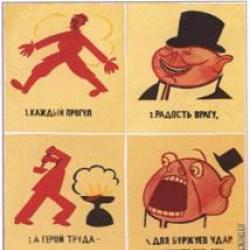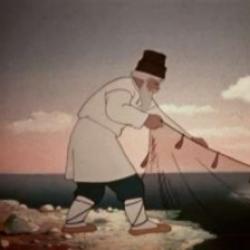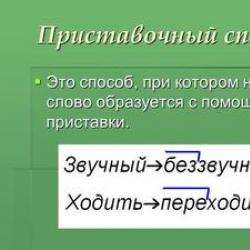That the poet was tired of the extraordinary adventure. An extraordinary adventure. Means of artistic expression
“Shine always, shine everywhere, until the last days…”
V. Mayakovsky
The poetry of Vladimir Mayakovsky can hardly be compared with folklore. But in his work there is a work that, due to the unusualness of its plot, resembles a fairy tale. “An extraordinary adventure that happened to Vladimir Mayakovsky in the summer at the dacha” is a poem of magic.
The heroes of the work are the poet and the sun. In a fit of anger, the poet accuses the luminary of the day of being a parasite and a useless pastime: “The parasite!...why stop by like that without doing anything, he should have come to me for tea!” “Golden-faced,” as the poet calls him, accepts the challenge, descends from heaven and, “spreading his ray-steps,” comes to the poet for tea: “Drive, poet, jam!” The very unusualness of the situation gives the reader a thought: what can connect the poet and the sun? What outcome of the story lies ahead? However, the “comrades” chatted all night, complaining to each other about their difficult lives. They agreed that they would each shed light on the world in their own way: the sun - with rays, the poet - with poetry. And under the “double-barreled shotgun of the sun” the “wall of shadows, a prison of nights” will not be able to withstand. Now the lyrical hero accepts the slogan of the sun: “shine - and no nails!”
The image of two luminaries - the luminary of light and the luminary of word - is presented by the author so simply that the reader has no doubts or confusion in their interpretation. Metaphors are one of the features of V. Mayakovsky’s lyrics; they are accurate and strong.
Under the fairy-tale plot, metaphorical images, hyperbolization, one truth is hidden: what is the poet’s purpose. V. Mayakovsky says that the mission of the creator of the word is to bring light to people, no matter what. And no matter how difficult the path may be, you cannot complain and get angry, reproaching others for the fact that everything is much easier for them. Every day the sun “rose to flood the world,” and it could not help but rise to the sky - people were waiting for warmth and light. A poet can find another profession so as not to go to the “heaven of life” every day. But then how will people see the light? When will it get warmer? What will they experience joy from? Therefore, the poem contains this life-affirming “slogan of mine and the sun!” The two luminaries will do their job. And if everyone does this well, the world will become brighter and more joyful.
Vladimir Mayakovsky is a poet who accepted the revolution with open arms, a man who discovered revolutionary poetry for creativity. The poet's poems are thoroughly imbued with a fighting mood and patriotic spirit. One of the post-revolutionary works is “An extraordinary adventure that happened to Vladimir Mayakovsky in the summer at the dacha.”
The poem “An extraordinary adventure that happened with Vladimir Mayakovsky in the summer at the dacha” was published in 1920. If before the revolution the poet’s works contained minor motifs, then after the revolution, including in this poem, one can see a call for a bright future and bright optimism.
It is known that Mayakovsky skillfully handled metaphors, and this work is no exception; the author created an extraordinary work that is similar to a real Russian folk epic, a fairy tale.
Genre, directions, rhyme
“An Extraordinary Adventure...” is a real Russian fairy tale, which was written during the times of futurism. There are intonations in the poem that make you trust the poet, feel every line, and this is a feature of Mayakovsky’s poems.
Here, the same ladder that the author used is more useful than ever - it helps to highlight pauses and logical stresses so that the reader does not miss anything.
The rhymes here are the most unusual: here is the exact rhyme “GROWTH - simple”, but here you will have to come to terms with the not quite ordinary “not melting - you and me.”
Main characters
The main character in “An Extraordinary Adventure...” is truly extraordinary - the sun. Another comparison with fairy tales comes to mind, because the sun, like many things in fairy tales, is animated.
Another hero of the poem is a lyrical poet who works tirelessly, about which he complains to the sun during their conversation.
Main theme
The theme of the work is simple - what is the role of the poet in the life of society? While talking, the sun and the poet reason that although a person can take instruments in his hands instead of a pen, the luminary cannot afford this.
In the end, the poet realizes that things are better for him than he expected, and there is no point in complaining. New acquaintances agree that everyone should do their job - let the sun shine on people, and the poet continue to shed light with his poems.
Meaning
The idea that Mayakovsky put into his work is actually extremely simple. At the conclusion of the poem, it can be read between the lines - everyone on earth must understand their purpose and follow the chosen path, and if they do something, then do it well.
It doesn’t matter, the poet says, what your profession is, what matters is how you perform it and how much soul you put into it.
Means of artistic expression
“The Extraordinary Adventure...” has a variety of expressions that make it incredibly beautiful. A lot of neologisms, such as “zenezhen”, “golden-faced” make the poem unique, and homonyms and colloquial vocabulary make the reader feel inspired by the conversation, forgetting that the poet is talking to the sun itself.
Of course, there were some metaphors, albeit often hidden ones: the sun in the poem sets and sets as if it were really something alive.
Interesting? Save it on your wall!The poem “An extraordinary adventure that happened to Vladimir Mayakovsky in the summer at the dacha” was written in 1920. Its theme is the role of the poet in public life, the educational value of poetry. The lyrical hero is a working poet who works a lot and gets very tired. He is annoyed by the seemingly idle life of the sun, and he invites the luminary for a conversation, for tea. The plot of the poem is a fantastic event, a meeting and conversation between the poet and the sun. The poet and the sun quickly find a common language and come to the conclusion that both will do their job well:
I will pour my sunshine,
And you are yours,
in poetry.
Like the captain, who is the soul and heart of the ship, so the poet, in Mayakovsky’s understanding, performs a great and responsible task: he controls the hearts and minds of people on one big ship called a country: “Hearts are the same engines. The soul is the same cunning engine,” the poet asserted. This is how the theme of two suns arises in the poem “An Extraordinary Adventure...” - the sun of light and the sun of poetry, which gradually develops and finds a very accurate and apt embodiment in the poetic image of a “double-barreled gun of suns”, from one trunk of which sheaves of light burst out, and from the other - the light of poetry. Before the power of this weapon, the “wall of shadows, the prison of nights” falls prostrate. The poet and the sun act together, replacing each other. The poet reports that when the Sun “gets tired” and wants to “lie down”, then “the sun rises at full strength - and the day rings again.”
The sun in the poem is a metaphorical image of the poet (“There are two of us, comrade”). The poet calls to “Shine always, shine everywhere...”, seeing this as the main purpose of the poet. Mayakovsky widely uses the technique of personification and grotesque (“the sun walks in the field”, “wants to lie down at night”, “stupid dreamer”).
During the lesson, students will get acquainted with the biography of Vladimir Mayakovsky, the originality of his poetry using the example of the poem “An extraordinary adventure that happened to Vladimir Mayakovsky in the summer at the dacha.” Analysis of the poem will help to understand the author and his civic and creative position.
After the death of his father, the family moved to Moscow. The future poet was engaged in revolutionary activities, worked as a propagandist, and was arrested three times. In 1910, Mayakovsky was released from Butyrka prison, where he spent eleven months. It is here that he writes his poetry. It can be said that Mayakovsky's release from prison was a symbolic entrance into art.
In 1911 he entered the Moscow School of Painting, Architecture and Sculpture. The social situation in Russia presented Mayakovsky with a choice - old life and old art or new life and new art. “I want to make new socialist art,” this is how the poet defined the goal of his life. Within the walls of the school, the future poet had a largely fateful acquaintance with the organizer of the Gileya group, D.D. Burliuk, who became one of the founders of futurism. It is in the almanac of this group - "A slap in the face to public taste"— Mayakovsky’s literary debut took place in December 1912.
In 1913, the poet published his first collection of poems entitled “I”, wrote the tragedy “Vladimir Mayakovsky” (he himself acted as the director of the production and the leading actor). As part of a group of futurists Mayakovsky travels around the cities and towns of Russia. Public speaking became the reason for his expulsion from the school.
The October Revolution of 1917 was greeted by Mayakovsky with joy and enthusiasm. The poet supports the young state with the artistic means available to him.
Since 1919, he has worked for three years at Windows of ROSTA, producing propaganda and satirical posters with poetic lines. In total, during this period he was the author of about 1,100 such “windows” (Fig. 2).

Rice. 2. Poster created by Mayakovsky in 1920 ()
Mayakovsky called ROSTA Windows a fantastic thing. Posters by “Windows...” artists were displayed in the windows of central stores in Moscow, on Kuznetsky Most, and some were even sent to other cities.
In the summer of 1920, Mayakovsky lived at a dacha in Pushkino (near Moscow), worked at ROSTA and traveled into the city every day. That's when it was written poem “An extraordinary adventure that happened to Vladimir Mayakovsky in the summer at the dacha.”
Everything about this poem is unusual: a plot that combines reality and fantasy, a special rhythm, a combination of simple and even colloquial words with the author’s neologisms.
Title of the poem
The poet deliberately chooses a long, cumbersome title for his poem: “An extraordinary adventure that happened to Vladimir Mayakovsky in the summer at the dacha.” Moreover, he adds a subtitle: “Pushkino, Akulova Gora, Rumyantsev’s dacha, 27 versts along the Yaroslavl railway. dor.” Thus, the title and subtitle contrast with each other: the unusual with the ordinary, the fantastic with the real.
Poem composition
- Exposition. "Everyday work of a poet"
- Commencement and development of action. “The poet’s quarrel with the sun. Invitation to "tea"
- Climax. "Procession of the sun. Conversation between the poet and the luminary"
- Denouement. "The poet's poetic credo"
Theme, idea, problems of the poem
The poem, according to the famous actor Vladimir Yakhontov, is stunning “with the audacity of the plot and the beauty of thought: the poet and the sun are two friends. One shines, the other sings.” All of it is illuminated with a joyful, sincere smile. A cascade of varied, sometimes unexpected rhymes, and a subtle rhythmic pattern enhance the impression of liveliness, fabulousness, and entertainingness of the narrative.
Exhausted by the summer heat and exhausting work, the poet-artist envied the sun because it did not shine at night, that is, it did not work, but rested (Fig. 3).

Rice. 3. Illustration ()
And so one day I got angry,
that everything faded in fear,
I shouted point blank to the sun:
Enough of hanging around in hell!”
I shouted to the sun:
“Damot!
you are covered in the clouds,
and here - you don’t know either winters or years,
sit down and draw posters!
The sun comes to visit the poet and in their conversation it turns out that both have a lot in common. The task of the sun, like the poet, is to illuminate this gray world, to fill it with colors, life, and meaning. Both realize the importance of their work. And despite the complexity of the task, the author proclaims them the general slogan that became the main idea of the poem:
Always shine
shine everywhere
until the last days of the Donetsk,
shine -
and no nails!
This is my slogan -
and sun!
Thus, Mayakovsky expressed his attitude towards poetic work in the poem, choosing for this an unusual, metaphorical manner in order to tell the reader what real poetry should be.
Means of artistic expression and stylistic techniques
Metaphor- one of the main artistic tropes used by the poet. His metaphors are unusual and original.
For example:
1. Pushkino hill humped
Shark Mountain,
and the bottom of the mountain -
was a village
the roof was crooked with bark .
2. Having spread out the ray-steps,
the sun walks in the field.
Such metaphors are called extended. Unlike a simple metaphor, such a metaphor contains a figurative similarity to a certain life phenomenon and is revealed throughout the segment or the entire poem .
Hyperbola(artistic exaggeration). Its use helps the author to endow the hero of the poem with the temperament and emotionality of a creative personality. For example, unbearable heat is conveyed in the following hyperbole: “the sunset burned with a hundred thousand suns.” The character of the hero of the poem, the tendency to exaggerate everything, to perceive and experience things more acutely than ordinary people, is heard in the remark: “What have I done! I'm dead!
Pun(play on words)
For example:
without causes come in,
for tea it's gone would!
(Come in - hide, hide, fall into a hole; would go - invitation to visit).
Stylistic vocabulary
In the dialogues between the hero and the sun, the author deliberately uses colloquial, colloquial vocabulary. This makes the conversation relaxed and very natural. At the beginning, when the hero is angry, his speech is rude and harsh. The poet calls the sun parasite, claims that it hanging around idle. The sun is also not inferior: “- Drive tea, drive, poet, jam! The hero exclaims in annoyance in response: “- The devil pulled my audacity to yell at him" And soon the conversation turns into a friendly conversation:
do not be sad,
simple things!
And to me, do you think
- Go try it!
In addition to colloquial vocabulary, Mayakovsky, as a representative of futurism, experiments with words, creating his own neologisms.
For example:
"Hill of Pushkino hunched over» ( hunched over- derived from hunched over).
"Wait a minute! listen, golden-browed» ( golden-browed formed by analogy with golden-haired).
"But the strange one from the sun being flowed" ( being- i.e. light derived from clear)
"Let's go, poet, let's look, let's sing"(derived from look, sing)
“And wants to lie down at night, stupid dream book» ( dream book- derived from insomnia).
Poetic form
While reading the poem, you probably noticed that it consists of lines of unequal numbers of syllables. This technique is called ladder. It was invented by Mayakovsky. The poet breaks the line and continues writing with a new one.
Compare:
Mayakovsky named the main reasons for using the new poetic form in his book “How to Make Poems” (1926) (Fig. 4). This is, first of all, a clearer design of the rhythm of the verse, since, according to Mayakovsky, traditional punctuation marks are not sufficiently adapted for this.
The article was written by Mayakovsky in 1926. In it he expresses his view of art.
For poetic work you need:
1. The presence of a task in society (social order)
2. Target setting
3. Material. Words. Constant replenishment of storage facilities, the sheds of your skull, with necessary, expressive, rare, invented, updated, produced and all sorts of other words.
Mayakovsky gives an example of how he replenishes his repositories with new words and images. The poet has a notebook with him in which he writes down interesting words. He recalls one incident: “In 1913, returning from Saratov to Moscow, in order to prove to some carriage companion my complete loyalty, I told her that I was “not a man, but a cloud in pants" Having said this, I immediately realized that this could be useful for a poem, but what if it gets circulated by word of mouth and is wasted in vain? Terribly worried, I interrogated the girl with leading questions for half an hour and calmed down only after making sure that my words had already flown out of her next ear. In two years "a cloud in pants" I needed it for the title of a whole poem.”
Another important point in the process of creating a poem, Mayakovsky called the skills and techniques of word processing: rhymes, meters, alliteration, images, style reduction, pathos, ending, title, outline, etc. In the article, the poet shares how he worked with the word in the process of creating the poem “Sergei Yesenin”:
“Without any comments, I will give a gradual processing of words in one line:
1. our days are poorly equipped for fun;
2. our days are joyfully poorly equipped;
3. our days are poorly equipped for happiness;
4. our life is poorly equipped for fun;
5. our life for joy is poorly equipped;
6. our life is poorly equipped for happiness;
7. Our planet is poorly equipped for fun;
8. Our planet is poorly equipped for fun;
9. Our planet is not particularly equipped for fun;
10. Our planet is not particularly equipped for fun;
11. Our little planet is not very equipped for pleasure;
and finally the last, 12th -
12. Our planet is poorly equipped for fun.
I could make a whole defensive speech in favor of the last of the lines, but for now I will be content with simply copying these lines from the draft to demonstrate how much work it takes to produce a few words.
Bibliography
- Korovina V.Ya. Didactic materials on literature. 7th grade. — 2008.
- Tishchenko O.A. Homework on literature for grade 7 (for the textbook by V.Ya. Korovina). — 2012.
- Kuteinikova N.E. Literature lessons in 7th grade. — 2009.
- Korovina V.Ya. Textbook on literature. 7th grade. Part 1. - 2012.
- Korovina V.Ya. Textbook on literature. 7th grade. Part 2. - 2009.
- Ladygin M.B., Zaitseva O.N. Textbook-reader on literature. 7th grade. — 2012.
- Kurdyumova T.F. Textbook-reader on literature. 7th grade. Part 1. - 2011.
- Phonochrestomathy on literature for the 7th grade for Korovina’s textbook.
Expanded metaphor;
Hyperboles;
Colloquial, colloquial vocabulary;
Neologisms.
- What is the uniqueness and originality of Mayakovsky's poetry?
Mayakovsky is a writer who wrote many wonderful works, many of them were written in the post-revolutionary period. They contain special fighting notes, notes of calling for the important role of the poet and his work. Just the theme of poetry and the poet is well revealed in the poem Makovsky’s Unusual Adventure at the Dacha, which we have to do.
Mayakovsky wrote this unusual adventure in 1920. Working on the analysis of the writer’s poem, I would like to say that his work is somewhat similar to a fairy tale, to some kind of fantastic work, where the sun plays the role of one of the heroes. Its author puts on an inspired face.
Summer at the Mayakovsky dacha
The action takes place in the summer at the dacha. At the beginning of his work, the author, having found beautiful words, describes a sultry day in July. The hero often watched the sun, and then one fine day he realized how idle, aimless, easy life is for the sun, which day after day rises and sets and does nothing else. Mayakovsky began to get angry at such a life of the sun, and, unable to bear it, turned to him with an angry tirade, calling the sun a parasite, a pampered creature. The hero invites the luminary to his place for tea. After his daring words, the hero was frightened, because the sun had indeed gone down and headed towards the house, demanding tea and jam.
The characters spend the entire evening talking, talking about how difficult their lives are. At the same time, the writer began to understand how difficult it is for the sun, which has no choice and has to get up every day and illuminate the earth, warm it, while he can always change his profession. The author realized how selfless the work of the sunshine is and it is such work that changes the world, such return can make life better and brighter.
In his work, the author touches on the theme of two suns - the sun of poetry and the sun of light, developing this theme to the end. Concluding his poem, the author recalls the double-barreled shotgun of the sun, where sunlight will pour from one trunk, and poetry from the other. And so, acting together, the heroes will replace each other and fulfill their calling. The poet will shed light with his poems, and the sun will illuminate the earth with its light. They will shine always and everywhere, and no nails. It is under this slogan that the heroes of Mayakovsky’s work An Extraordinary Adventure lived and will live, on which we are making an analysis. On such inviting notes, with such optimistic lines, Mayakovsky ends his adventure in the summer at the dacha.






